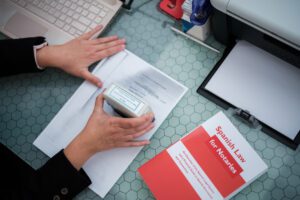Because there is not such a thing as sworn translators in the UK, you might have doubts about what this type of translation is. Below you will find answers to Spanish sworn translation FAQs:

What is a Spanish sworn translation?
A Spanish sworn translation will bear the officially recognised sworn translator's signature and stamp registered with the Spanish Ministry of Foreign Affairs, as well as a certification accrediting its accuracy.
What is the process to follow for sworn translations?
First, you need to confirm with the organisation or authority requiring the translation whether your document needs legalisation. If so, you need to legalise your document before translation. The cheapest and fastest way to do it is apostilling.
Once legalised, you will need to send me a scanned copy of the files. It is essential that I receive a good quality copy.
Except when the original copy is not fully legible, in which cases the translator includes a note, all the content needs to be translated, including any stamps, seals and letterheads.
When can I expect to receive my sworn translation?
This is subject to availability, but in general I can send you your translation on the next day for one or two-page documents. On top of this, you need to add delivery times for ordinary mail, but you always have the option to choose guaranteed next-day delivery. Please check Royal Mail's delivery options.
I need extra copies of my sworn translation. How much do I have to pay?
I charge copies at 15 % of the normal price.
My document is damaged. Will the sworn translation be valid?
Bearing official status, a sworn translation is valid and should be accepted. Please bear in mind, however, that the original document might not be accepted by the recipient body or official.
Do you deliver sworn translations electronically?
I can send you a scanned / digital copy of the sworn translation (you can check the process here). Please bear in mind, however, that the recipient might only accept a hard copy.
I understand that I cannot receive a quote without showing the document first. But what about confidentiality?
In these cases, I will sign a unilateral confidentiality (non-disclosure / NDA) agreement requiring me to maintain the information contained in the document confidential.
I have already completed the translation. Will you sign it and stamp it as a sworn translation?
Unfortunately, I do not certify translations carried out by others. Sworn translations are signed, stamped and certified as performed by the sworn translator himself/herself.
My document needs to be legalised. Can you do it?
Sworn translators are only responsible for the translation process. Legalisation (or apostilling, if applicable) is a separate formality.
